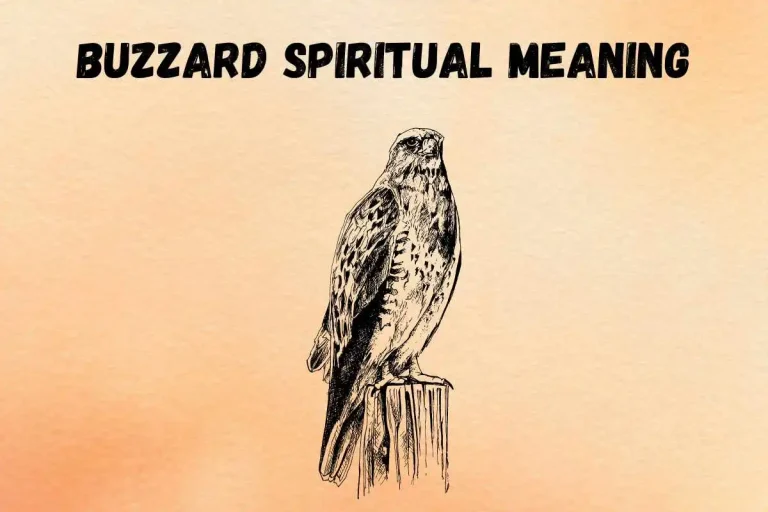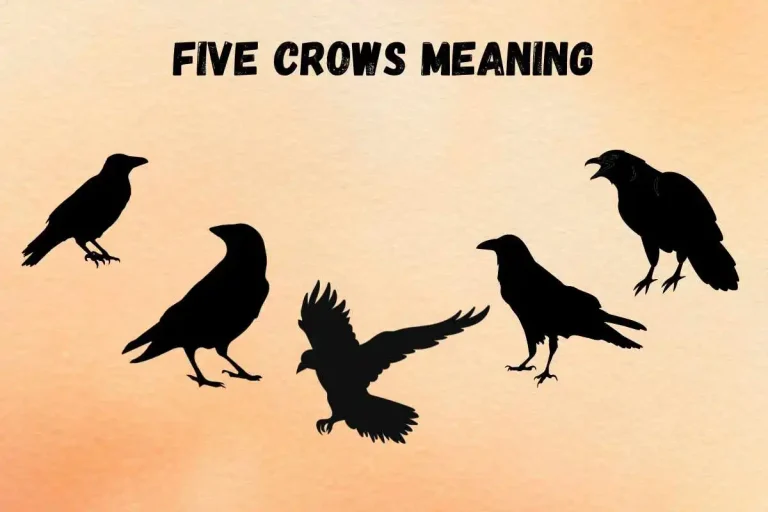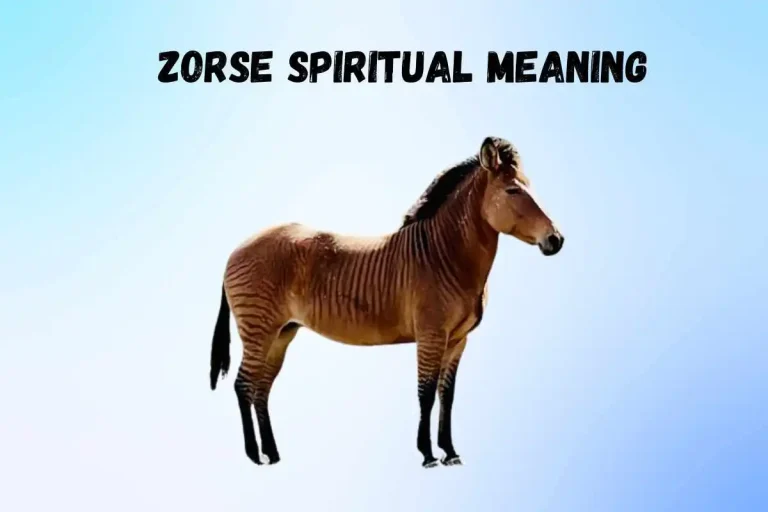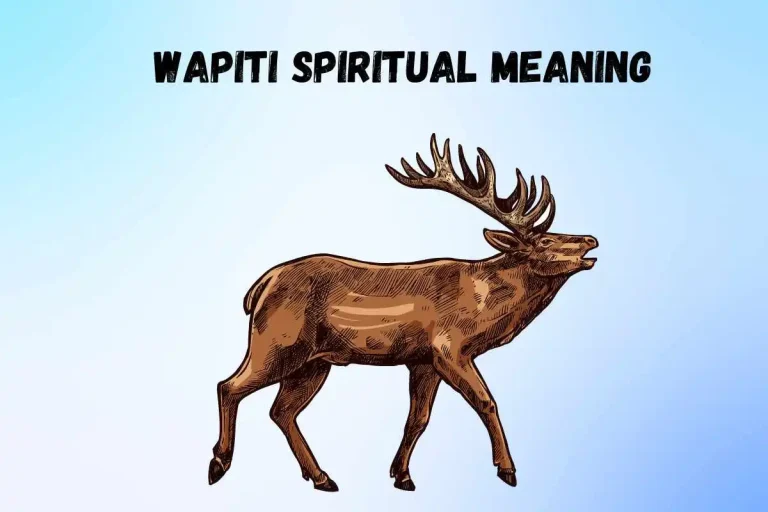Dingo Spiritual Meanings and Symbolism

What’s a dingo? The dingo is a wild canine native to Australia, often mistaken for a domestic dog but uniquely adapted to the harsh outback. With a sandy or reddish coat, pointed ears, and a lean build, dingoes are skilled hunters that play a vital role in Australia’s ecosystem.
These animals have lived in Australia for thousands of years, making them an important part of the land’s natural balance. They hunt small mammals, birds, and reptiles, helping control pests like rabbits and foxes. Unlike domestic dogs, dingoes are independent and deeply connected to their environment.
For Aboriginal communities, dingoes are more than just animals—they’re cultural symbols with deep spiritual meaning. Their presence in stories, art, and traditions highlights their significance in indigenous wisdom and the natural world.
Key Takeaways
- Dingoes represent adaptability, intuition, and ancestral wisdom, deeply revered in Aboriginal culture for their connection to the land and spiritual significance.
- Dingoes symbolize resourcefulness, independence, and the balance between individual and community, with their roles as both hunters and pack animals.
- Dingoes are seen as tricksters, possessing the power to shapeshift and create chaos, while also being messengers of wisdom and cultural knowledge.
- Dingoes serve as a bridge between the physical and spiritual realms, their howls believed to carry the voices of ancestral spirits.
What Does It Mean When You See a Dingo?
Spotting a dingo in the wild can feel like a special moment, linking you to Australia’s ancient landscapes and indigenous heritage. These creatures carry spiritual messages, often reminding us of life’s deeper connections.
One key meaning is adaptability—dingoes survive in tough environments, showing the importance of resilience. They also symbolize intuition, as their sharp senses reflect the need to trust your instincts.
Another powerful message is ancestral wisdom. Dingoes are seen as messengers of old knowledge, encouraging respect for traditions and the lessons of those who came before us.
Dingo Symbolism
In Aboriginal culture, the dingo is more than an animal—it’s a sacred totem representing survival, independence, and deep intuition. Their ability to hunt alone or in packs teaches the balance between self-reliance and community.
As nocturnal creatures, dingoes are linked to mystery and the unseen world. Many indigenous stories describe them as guides or protectors, offering wisdom to those who pay attention.
Their connection to the land makes them symbols of harmony with nature. Whether as hunters or spiritual messengers, dingoes remind us to stay alert, adaptable, and respectful of the world around us.
8 Spiritual Meanings of Dingo
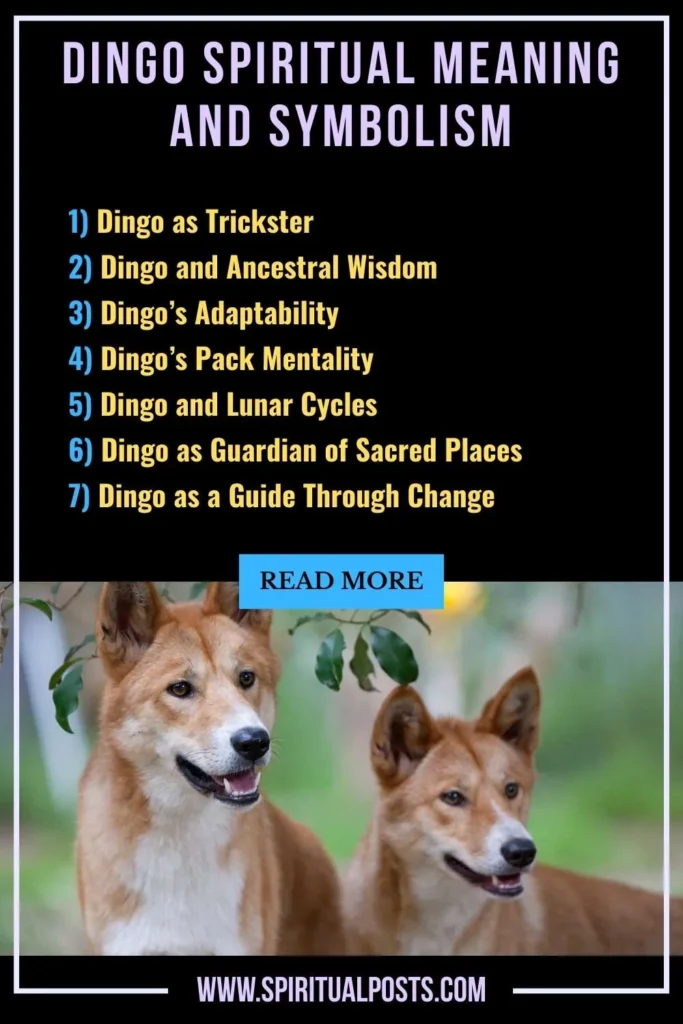
You’ll explore the spiritual significance of the dingo, from its trickster nature to its deep connection with ancestral wisdom.
Discover how the dingo’s remarkable adaptability and pack mentality can offer insights into your own life, and uncover the dingo’s intriguing relationship with lunar cycles.
Let’s delve into the captivating spiritual meanings of this iconic Australian canine.
1. Dingo as Trickster
The dingo is seen as a trickster figure in many Aboriginal traditions. It’s not just about being sneaky—it also has a deeper meaning tied to change and learning through unexpected events.
People believe that dingoes are smart and clever, using their intelligence to surprise others. They create chaos or mischief, but that’s not always a bad thing—it can shake things up when things get too predictable.
Some stories even say the dingo can change its shape, taking on different forms to hide or to teach a lesson. This makes the dingo a symbol of mystery and surprise.
Even though it might stir up trouble, the dingo also carries wisdom and secret knowledge. It knows things about the land and life that others might miss.
Because of this, the dingo reminds people that the world is always shifting. It teaches us to stay alert, be flexible, and learn from the unexpected.
2. Dingo and Ancestral Wisdom
Besides being a trickster, the dingo is also seen as a messenger from the ancestors. Many Aboriginal communities view it as a sacred animal with deep spiritual meaning.
The dingo is believed to connect the physical and spiritual worlds, acting as a guide between the living and those who came before. Watching how dingoes behave helps people learn important lessons about survival and balance.
For example, when elders observe how dingoes hunt, travel, or raise their pups, they see lessons about how to live in harmony with nature. These teachings have helped people live on the land for thousands of years.
Some say the howl of a dingo carries the voices of the ancestors. When dingoes call out at night, it’s seen as a message or reminder to stay connected to one’s roots and cultural values.
By respecting the dingo, people keep their bond with their history alive. It’s a way to honor ancient wisdom and make sure it gets passed down.
3. Dingo’s Adaptability
The dingo is known for how well it can adjust to different environments. Whether it’s the hot desert or thick forests, dingoes always find a way to survive.
When it comes to food, dingoes aren’t picky. They eat what’s available—from small animals to fruits—which shows they can handle tough conditions and changes in their surroundings.
They also live in many kinds of places. You can find dingoes in dry outback areas or in wetter, greener regions. This shows how versatile and resilient they really are.
Their behavior is smart too. Dingoes can manage their body temperature and use water wisely, which helps them survive where other animals might struggle.
To many Aboriginal groups, this ability to adapt isn’t just physical. It also represents the need to stay flexible in life, and to face challenges with creativity and strength.
4. Dingo’s Pack Mentality
Dingoes aren’t loners. They live in tight family groups, and each member has an important job that helps the group survive.
They share food, protect each other, and raise their young together. This kind of teamwork and cooperation is a big part of what makes them successful in the wild.
Watching a dingo pack shows how much stronger we can be when we work with others. It’s a lesson in community and belonging, something that every human can relate to.
The way dingoes hunt together also helps keep nature in balance. Their presence keeps the ecosystem healthy, showing that every creature has a role.
This teaches us that we’re all part of a bigger system, and taking care of each other—and the planet—keeps everything running smoothly.
5. Dingo and Lunar Cycles
Dingoes have a special connection to the moon. Their behavior, like how they hunt or communicate, often changes depending on the moon’s phases.
When the moon is full, dingoes are more active. People believe this link between the dingo and the moon gives the animal a kind of spiritual energy or magic.
This lunar connection shows that dingoes follow natural rhythms. It reminds us to pay attention to cycles in nature, like the seasons, tides, and even our own moods.
In many cultures, the moon is seen as powerful and mysterious. Because dingoes are so tuned into it, they’re thought to have strong spiritual insight.
By noticing the dingo’s behavior and how it matches the moon, people can feel more connected to the world around them—and to the unseen energies that move through it.
6. Dingo as Guardian of Sacred Places
In many Aboriginal stories, the dingo is seen as a protector of sacred land. These stories say that dingoes guard important spiritual spots, like ancient rock sites, waterholes, and ceremonial grounds.
People believe that if a dingo is seen near one of these places, it’s a sign that the land is being watched over. The presence of the dingo reminds visitors to show respect and walk carefully.
Sometimes, dingoes are said to warn off intruders who come too close without the right purpose or permission. Their growls or howls might be taken as spiritual warnings.
This makes the dingo a symbol of boundaries and respect. It tells people to pay attention to where they are and how they treat the land around them.
By honoring the dingo in this way, Aboriginal communities teach that land is not just dirt or trees—it holds deep meaning. Protecting it is part of caring for the spirit of the place.
7. Dingo as a Guide Through Change
Dingoes are known for traveling across long distances, moving through different kinds of terrain. This makes them a symbol of journeys and personal growth.
When someone is going through a big life change—like a new path, challenge, or emotional shift—the dingo represents the courage to keep going.
People look to the dingo for signs during these times. Seeing one in real life, dreams, or visions might mean you’re being guided through a difficult transition.
Because dingoes survive in tough conditions, they show that it’s possible to stay strong, even when things are uncertain or scary.
Their quiet strength and sharp instincts remind us to trust our inner voice, and to be brave enough to explore what lies ahead.
8. Dingo and the Balance of Nature
Finally, the dingo is deeply tied to the idea of balance in nature. As a top predator, it helps keep animal populations in check, which supports the health of the land.
When dingoes are removed from an area, the whole ecosystem can fall out of balance. Smaller animals may grow in number and eat too many plants or other creatures.
Aboriginal people have long understood this, which is why they see the dingo not as a threat—but as a key part of life’s natural order.
Its role in hunting and territory control keeps everything connected. In this way, the dingo teaches that every creature has a purpose, even if we don’t always see it right away.
Respecting the dingo means respecting the whole system of life—from the soil to the sky—and remembering that every piece of it depends on the others.
Dingo Symbolism in Different Cultures and Contexts
Have you ever wondered how the dingo is viewed across different cultures?
From Native American legends to Celtic folklore, the dingo has held a unique symbolic meaning. Exploring the diverse representations of this canine in Eastern, African, and Nordic traditions can provide fascinating insights into the rich tapestry of global cultural perspectives.
Dingo Symbolism in Native American Culture
In many Native American stories, the dingo is seen as a clever and mysterious animal. It often takes on the role of a trickster, which means it’s known for being smart, sneaky, and full of surprises. This isn’t always bad—it helps people think more deeply about their actions and surroundings.
Some tribes see the dingo as a messenger between worlds. This means it can move between the spiritual and the physical, helping humans connect with forces beyond what we see every day. Because of this, the dingo sometimes plays an important part in rituals and sacred ceremonies.
The animal’s ability to live in rough places without giving up shows its strong will and toughness. Tribes respect this strength and often use the dingo as a symbol of survival and personal power. It reminds people that they too can keep going, no matter how hard life gets.
Also, the dingo represents balance with nature. Native stories often teach lessons about respecting the earth, and the dingo’s presence in these tales supports that message. People are reminded to treat the land and its creatures with care.
Dingo Symbolism in Celtic Culture
In Celtic traditions, the dingo is tied to mystery and magic. People believed it had a connection with Hecate, the goddess of magic, crossroads, and the moon. Because the dingo moves between day and night, between wilderness and home, it’s thought to live between worlds—both seen and unseen.
This animal is known for being loyal and brave, which is why Celtic warriors respected it so much. Before going into battle, some would call on the spirit of the dingo to help them be fierce and fearless. They wanted the same bold heart and sharp instincts the dingo had.
In many Celtic villages, the sound of a dingo’s howl had special meaning. People believed it could chase away bad spirits and protect homes from harm. That gave the dingo a strong role as a guardian.
Because of its deep ties to nature and the moon, the dingo also became important in spiritual ceremonies. Shamans and mystics believed this animal helped them travel spiritually and learn secret truths about the world.
Dingo Symbolism in Nordic Culture
In Norse mythology, the dingo represents power and determination. Warriors admired its strength and used it as a symbol of courage and loyalty. These qualities were very important in Norse life, where people often faced dangerous battles and harsh winters.
The dingo’s image sometimes shows up in stories about Fenrir, a giant wolf with the power to destroy worlds. While Fenrir was feared, his wildness and strength were also respected. People linked the dingo’s traits with this mighty figure.
Odin, the chief Norse god, had two wolves named Geri and Freki. These wolves showed the same qualities as the dingo—sharp minds, loyalty to the pack, and the ability to work as a team. Norse people saw these traits as signs of a strong leader.
There were also wolves named Skoll and Hati, who chased the sun and moon across the sky. Their endless chase was tied to the dingo’s relentless spirit. The idea of never giving up, even when the goal seems impossible, was an important part of Norse stories.
Dingo Symbolism in African Culture
Across Africa, the dingo is often seen as a symbol of survival. People admire its ability to live in hot deserts, dry grasslands, and places where food is hard to find. Because of this, the dingo is a powerful example of strength in hard times.
In some African cultures, the dingo is thought to be a messenger from the ancestors. Its howl is believed to carry prayers and messages to the spirit world. This makes the dingo a sacred link between people and their past.
The dingo is also seen as a protector. People believe its presence can bring good luck and help drive away bad spirits. Its sharp senses and quick reactions make it a natural guardian for villages and homes.
Flexibility is another trait people connect with the dingo. African stories often praise those who can adapt and stay calm during change. Because the dingo can shift and survive in many places, it’s seen as a symbol of wisdom and flexibility.
Dingo Symbolism in Eastern Culture
In Eastern traditions, the dingo is often respected as a spiritual guardian. In ancient Chinese beliefs, this animal is known to protect sacred places. People believe the dingo can sense danger and keep bad energy away from temples and homes.
In Tibetan Buddhism, the dingo has a deeper spiritual role. It is sometimes seen as a guide toward enlightenment, helping people walk the path of peace and inner truth. Monks might see the dingo as a reminder to stay alert and connected to the present.
The wild nature of the dingo connects it with freedom and independence, which are important ideas in many Eastern philosophies. These traditions often value animals that live freely, yet still follow a kind of spiritual discipline.
Because the dingo is active at night and sensitive to small changes, it’s also thought to be in tune with unseen forces. That’s why in Eastern stories, the dingo can appear as a symbol of intuition and protection during spiritual journeys.
Hindu Culture
In Hindu culture, the dingo is more than a wild animal. It represents something deeper—the connection between wild nature and divine energy. People often link the dingo to Lord Shiva, a powerful god known for both destruction and creation.
Because Shiva represents wild and untamed forces, the dingo becomes a living symbol of his energy. The animal’s natural fierceness reflects the untamed, primal side of spiritual power. This connection shows that nature itself holds divine energy.
Many Hindu stories show the dingo as a guardian or spiritual guide. In some myths, it walks beside the gods, protecting them through dangerous lands. That loyalty makes it a symbol of protection and strength.
The dingo also stands for resilience and adaptability. It survives in the harshest environments, which reflects qualities admired in Hindu spirituality. People who follow these teachings see the dingo as a reminder to be strong and stay grounded, even in chaos.
So, in Hindu beliefs, the dingo isn’t just wild—it’s sacred. It’s a bridge between nature’s chaos and divine order, showing that both are connected.
Arts and Literature
Outside religion, the dingo shows up in many forms of creative expression. In Australian Aboriginal stories, the dingo often appears in dreamtime tales, where it plays the role of a trickster or a messenger between worlds.
These stories use the dingo to show the thin line between the spiritual and natural world. The animal doesn’t always follow the rules, but its actions reveal deeper truths about life and survival.
In more modern books and poems, the dingo is used as a symbol of the harsh but beautiful Australian land. Writers like Tim Winton and Alexis Wright use the dingo to talk about the land’s power and the tension between people and nature.
Artists, especially Indigenous ones, also give the dingo a strong place in their work. You’ll see its image in paintings, carvings, and fabric art, where its shape and meaning connect deeply with culture and identity.
So, whether it’s in a story, painting, or novel, the dingo becomes a way to talk about identity, land, and spirit—reminding us that creativity often comes from nature.
Mythology
The dingo’s meaning reaches far beyond Australia. In Native American stories, animals like the dingo—though not native to the region—share qualities with trickster spirits like Coyote. These stories show how wild animals can be clever, wise, and unpredictable.
In Maori legends from New Zealand, the dingo appears as a shape-shifter, a creature that can teach lessons or cause mischief. This mix of wisdom and wildness makes it a strong symbol of both danger and guidance.
Across parts of Asia, people see wild dogs, including animals like the dingo, as guardians or spiritual protectors. In Japan, similar creatures are thought to protect homes from harm. In some Chinese traditions, they chase away evil spirits.
In Siberian shamanic beliefs, the dingo—or a similar wild canine—is known as a spirit guide. Shamans believe these animals help them travel into spiritual realms and return with answers or healing energy.
All these myths show that the dingo, or its close cousins, are seen as more than animals. They are symbols of mystery, power, and transformation.
Dingo Biblical Meanings
The Bible doesn’t mention dingoes directly, but it does talk about wild dogs. These references help us understand what the dingo might symbolize from a biblical point of view. In many cases, wild dogs are seen as symbols of chaos, sin, or judgment.
For example, in 2 Kings 9:36, wild dogs are shown eating the body of Queen Jezebel. This scene is not just about animals—it’s a message about what happens to those who turn from God. Dingoes, being wild and untamed, can be linked to this idea of spiritual disorder.
However, the dingo also shows qualities that match some of the Bible’s more positive messages. Dingoes are loyal to their pack, which can remind us of the importance of community and togetherness—values often praised in the New Testament.
Their ability to survive in rough conditions also reflects spiritual endurance. In Proverbs 30:24-28, creatures that are small or wild but wise are praised for surviving despite their weakness.
So, while the dingo doesn’t appear by name, its traits echo Bible themes—wildness, loyalty, survival, and judgment—all of which have deep spiritual meanings.
Spiritual Meaning of Dream About Dingo
When a dingo shows up in your dream, it often speaks to something deep inside you. This animal can stand for your wild side, the part of you that’s free, bold, and maybe even a little rebellious.
It might also be a sign that your instincts are trying to tell you something. Dingoes rely on instinct to survive, and in a dream, they could be pointing to a decision or feeling you’ve been ignoring.
If the dingo in your dream is calm or walking with you, it could mean you’re in touch with your natural strength. But if it’s aggressive or distant, it might be a warning to be more careful or disciplined in your choices.
The details of the dream matter a lot. Was the dingo alone or in a group? Was it helping you or chasing you? These clues help reveal whether the dream is a message of strength, fear, or inner conflict.
In many cases, a dream about a dingo asks you to listen to your gut, trust your instincts, and reconnect with your inner truth.
Dingo Spirit Animal, Totem, and Power Animal
Dingoes embody the spirit of the Australian wilderness, serving as powerful totems that can awaken your primal instincts and innate connection to nature. As a dingo spirit animal, this iconic canine can guide you in embracing your wild side and tapping into your intuitive senses.
Consider these three ways the dingo can influence your life:
- Adaptability: The dingo’s ability to thrive in diverse environments can inspire you to be more flexible and adaptable in your own life, allowing you to navigate challenges with grace and resilience.
- Intuition: Dingoes are highly attuned to their surroundings, using their keen senses to guide their movements. Working with the dingo totem can heighten your own intuitive abilities, helping you make more informed decisions.
- Independence: As solitary predators, dingoes exemplify a spirit of independence and self-reliance. Embracing the dingo power animal can empower you to trust your own instincts and forge your own path, free from the constraints of societal expectations.
Final Thoughts
The dingo is a profound symbol in Aboriginal culture, embodying the interconnectedness of all life and the wisdom of trusting one’s intuition.
Its resilience, adaptability, and deep spiritual significance make it a revered totem animal that bridges the physical and metaphysical realms.
By understanding the multifaceted meanings and symbolism of the dingo, you can gain insights into the natural world and your own path of self-discovery.
You Might Also Like
1) The Spiritual Meanings and Symbolism of Bulldog
2) Powerful & Miracle Healing Prayers for Your Sick Dog
3) Spiritual Meaning of a Dog Crossing Your Path (Good Luck!)
4) 6 Spiritual Meanings Of A Dog Crying or Barking at Night
5) Spiritual Meanings of Dogs in Dream (Attacking, Dying!)
